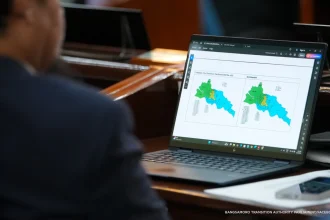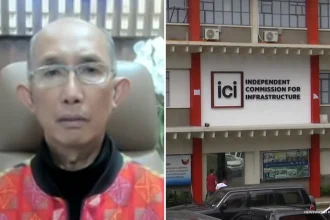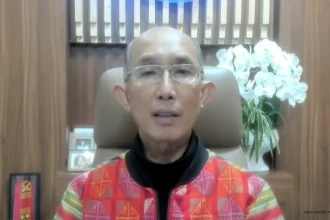
Taipei, Taiwan — The Philippines rejected China’s claim of prior notification and inspection of Philippine vessels in the last resupply mission to a grounded naval ship that serves as the country’s outpost in disputed waters.
Foreign Affairs spokesperson Tess Daza lamented the “mischaracterization” of the Chinese Foreign Ministry on what transpired during the last resupply activity to the crew of the BRP Sierra Madre on July 27.
“Instead of acknowledging how two countries were able to manage differences in order to avoid miscalculation and misunderstanding, the spokesperson chose to misrepresent what has been agreed between the Philippines and China regarding RORE (rotation and resupply) missions in Ayungin Shoal,” said Daza in a statement.
She added that the understanding between Manila and Beijing “was concluded in good faith, with the explicit agreement that it will not prejudice national positions.”
“It is not helpful to keep giving false notions about what has been agreed on and how they were implemented,” she added.
National Security Council Assistant Director General Jonathan Malaya echoed the DFA statement and maintained that the Philippines will not ask permission from China.
“Gusto ko lang categorically pabulaanan iyan. Ang tawag ng DFA ay misrepresentation of facts, walang nangyaring boarding, walang nangyaring inspeksyon, wala pong nangyaring pagpapaalam, hindi po magpapaalam,” said Malaya in an interview with state-run television PTV.
[Translation: I just want to categorically deny that. The DFA calls it a misrepresentation of facts; there was no boarding, no inspection, no notification, and there will be no notification]
Foreign Affairs Secretary Enrique Manlao met with Chinese Foreign Minister Wang Yi on the sidelines of the ASEAN Foreign Ministers Meet in Vientiane, Laos.
Manalo reiterated the need for the two countries to adhere to the provisional agreement.
“We discussed the provisional agreement and our other differences on the South China Sea. I mentioned that both countries should adhere to the Agreement,” said Manalo in a post on X (former Twitter).
Manila also welcomed the support of allied countries such as Australia, Japan, New Zealand, Republic of Korea, Singapore, and the United States to the agreement as a positive step in de-escalating tensions in the West Philippine Sea.
“The conflicting statements of China and the Philippines in the Ayungin Shoal will become the guiding principles in filling the gaps of security anxieties in the West Philippine Sea,” said geopolitical analyst Chester Cabalza in a message to NewsWatch Plus.
“That means that we will see more faceoffs and debates on how the two opposing countries will mend their differences and agree on a common ground to resolve the perplexing maritime insecurity in the South China Sea,” he added.
Another geopolitical analyst and lecturer, Don McLain Gill, believes the PH-China agreement will be among the crucial topics to be discussed during the PH-US 2+2 ministerial meeting in Manila on July 30.
“It is crucial to incorporate contingency measures given the unreliable nature of China when it comes to agreements and confidence building measures. Therefore, a focus on such possibilities must be thoroughly discussed and planned between both allies,” Gill said.
















